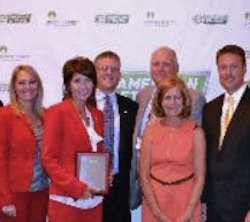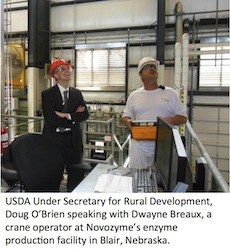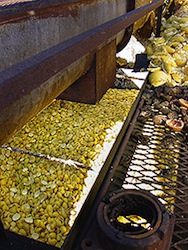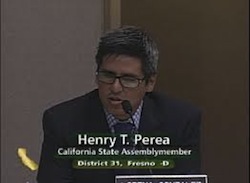 Northern Power Systems (NPS) has announced easier installation of their wind turbines through a series of upgrades. Core components such as the transformer are now built into the NPS60 and the NPS100. Other improvements include a new GSM network data connection package to allow seamless connectivity to wind turbines in the most remote areas. The new standard configuration is grid-ready and also offers a mobile network modem to provide a high speed data connection.
Northern Power Systems (NPS) has announced easier installation of their wind turbines through a series of upgrades. Core components such as the transformer are now built into the NPS60 and the NPS100. Other improvements include a new GSM network data connection package to allow seamless connectivity to wind turbines in the most remote areas. The new standard configuration is grid-ready and also offers a mobile network modem to provide a high speed data connection.- Join the Minnesota Renewable Energy Society for an informative and engaging 12 mile bicycle tour on Saturday, September 21, 2013 from 10:00 am to 3:00 pm. Participants will explore renewable energy technologies at homes and businesses around Minneapolis, Minnesota. This unique bike ride highlights solar installations, electric vehicles and more. The event is geared for persons who are considering buying a solar power system or are interested in sustainable living.
- There is still time to register for the OnSite Energy Conference taking place September 24, 2013 in Brisbane, Australia. The event will bring together solar, wind, biomass and biofuels stakeholders in a strategic event designed to carve a path forward for clean energy on a micro level. The program designed to help bring energy independence down to the level of community, business and industry by establishing small independent clean, alternative energy production facilities on site. Click here for more information and to register.
- Royal DSM, the global Life Sciences and Materials Sciences company, has awarded the DSM Science and Technology Award, Americas 2013, to Christopher M. Bates of the University of Texas in Austin (USA). The theme of this year’s award was Mastering Macromolecular Morphology. Bates received the award for his PhD research on block copolymer thin film orientation, which he conducted under supervision of prof. C. Grant Wilson. The award was presented to Bates by DSM’s Chief Technology Officer Marcel Wubbolts during the fall meeting of the American Chemical Society (ACS).
Rep Kristi Noem Wins “Fueling Growth” Ethanol Award
 Representative Kristi Noem (R-SD) has received a the “Fueling Growth” award for her leadership in supporting domestic energy production and pursuing energy independence through the production and use of ethanol. The award was given by Growth Energy and this is the third year she has been honored with the award. Rep. Noem was re-elected to the U.S. House of Representatives in 2012 and currently serves on the Agriculture Committee and House Armed Services Committee.
Representative Kristi Noem (R-SD) has received a the “Fueling Growth” award for her leadership in supporting domestic energy production and pursuing energy independence through the production and use of ethanol. The award was given by Growth Energy and this is the third year she has been honored with the award. Rep. Noem was re-elected to the U.S. House of Representatives in 2012 and currently serves on the Agriculture Committee and House Armed Services Committee.
“Ethanol has helped lower costs at the pump, produced thousands of jobs in South Dakota and is crucial to our pursuit of an all-of-the-above American energy plan,” said Rep. Noem. “I am honored to receive this award and will continue to support ethanol and our journey to reduce our nation’s dependence on foreign oil.”
Jeff Broin, Growth Energy co-chair and POET founder and Executive Chairman of the Board, added, “In a year when the oil industry is coming after renewable fuel like never before, Rep. Noem’s support has been invaluable. She is a staunch advocate for biofuels and the role they play in supporting South Dakota’s economy, saving drivers money at the pump and lowering our dependence on foreign oil.”
Biodiesel Maker & User Receive Breathe Easy Award
 A company that makes biodiesel and its customer that uses its green fuel are honored with a “Breathe Easy” award. Biodiesel Magazine reports Maine Standard Biofuels, which makes biodiesel from used restaurant oil, and Oakhurst, northern New England’s largest independent, family-owned dairy, received a Breathe Easy Leadership Honorable Mention Award from the Northeast Diesel Collaborative, recognizing their seven-year partnership.
A company that makes biodiesel and its customer that uses its green fuel are honored with a “Breathe Easy” award. Biodiesel Magazine reports Maine Standard Biofuels, which makes biodiesel from used restaurant oil, and Oakhurst, northern New England’s largest independent, family-owned dairy, received a Breathe Easy Leadership Honorable Mention Award from the Northeast Diesel Collaborative, recognizing their seven-year partnership.
[T]his year alone Maine Standard Biofuels supplied Oakhurst with more than 120,000 gallons of biodiesel produced less than 10 miles away from the dairy’s processing facility. The result of the partnership has allowed Oakhurst to decrease its diesel fuel emissions up to 70 percent annually.
“It is an honor to be recognized for our fuel emission reduction efforts alongside our partner Maine Standard Biofuels,” said David Green, Oakhurst fleet and facilities manager. “Today it’s possible for trucking fleets to use biodiesel without having to make equipment modifications and the benefits are really significant. Not only are we able to reduce our overall fuel emissions—a positive for the environment and our community—but we are also able to decrease total fuel costs, a positive for our business bottom line.”
“Maine Standard Biofuels is honored to be recognized alongside Oakhurst by the NEDC for our combined efforts to reduce greenhouse gas emissions,” said Jarmin Kaltsas, president of Maine Standard Biofuels. “We believe that by working with customers like Oakhurst we can make a difference in the environment as well as the economy. We are proud to be working with a company that has the vision of making the world a better place to live in.”
The two companies were nominated for the award by the Maine Clean Communities for their unique partnership.
USDA’s Doug O’Brien Visits Novozymes’ Facility
 During the Advanced Biofuels Conference that took place last week in Omaha, Nebraska, Novozymes hosted USDA Under Secretary for Rural Development, Doug O’Brien. Following his keynote address, O’Brien headed to Blair, Nebraska, the home of Novozyme’s enzyme manufacturing facility.
During the Advanced Biofuels Conference that took place last week in Omaha, Nebraska, Novozymes hosted USDA Under Secretary for Rural Development, Doug O’Brien. Following his keynote address, O’Brien headed to Blair, Nebraska, the home of Novozyme’s enzyme manufacturing facility.
Also on the tour of the Novozymes facility were several members of Novozymes plant management, Jim Realph, Mayor of Blair, Neb., and Maxine Moul, USDA Rural Development Director for Nebraska.
Novozymes operates two enzyme manufacturing plants, one of which opened in Blair in May of 2012. This plant produces enzymes for both first generation biofuel production, such as corn-based ethanol, as well as advanced biofuels such as cellulosic fuels produced from corn stover and cobs, switchgrass and more. Novozymes has dozens of strategic partnerships with biofuel companies around the world to help develop efficient and cost-competitive biofuels from a wide-range of feedstocks. The Blair production facility employs 100 people.
Reducing Wildfires and Making Biodiesel
 A project designed to cut back on wildfires in northern Arizona’s forests will also result in the green fuel biodiesel being produced. This story from the Mojave Valley Daily News says the project looks to thin 300,000 acres in four forests over 10 years with the harvested trees to go into biodiesel production, among other products.
A project designed to cut back on wildfires in northern Arizona’s forests will also result in the green fuel biodiesel being produced. This story from the Mojave Valley Daily News says the project looks to thin 300,000 acres in four forests over 10 years with the harvested trees to go into biodiesel production, among other products.
Pioneer Forest Products was selected in 2012 to thin 300,000 acres in four Arizona forests over 10 years. But the Montana-based company had trouble with financing and talked to the U.S. Forest Service earlier this year about transferring its contract.
The Forest Service on Friday announced the approval of a transfer to Good Earth Power AZ LLC., whose parent company in Oman primarily does work outside the U.S. Forest officials said they determined that Good Earth is financially and technically sound to carry out the work.
The stewardship contract that the Forest Service has called the largest in its history is meant to restore a 2.4 million-acre area along the Mogollon Rim to reduce wildfire risks and create sustainable forest industries.
Good Earth has a $50 million mill in Winslow, Ariz., and a power plant to produce synthetic gas to be turned into biodiesel as part of its plans.
Emotions Mixed on EU Biofuels Vote
There are very mixed emotions with the European Union’s (EU) vote on the biofuels and indirect land use change (ILUC) that took place earlier this week. The EU voted for 6 percent cap. In October of 2012, MEPs (Members of the European Parliament) were voting to cap the amount of land-based and food-based biofuels used in transport fuel. In October, the cap of 5 percent on the amount of food that can be used to meet the overall 10% target for renewable energy in transport by 2020 was proposed. Since then, a cap of 6.5 percent was also offered.
 The 6 percent cap voted for by MEPs represents an increase on the current figure of 4.5 percent. They also voted to recognize the link between biofuel production and the destruction of forests and other landscapes, (i.e. indirect land use change or ILUC) but not until 2020. And backed a 2.5 percent target for so-called second generation biofuels – made from non-food sources such as agricultural waste, sewage and algae.
The 6 percent cap voted for by MEPs represents an increase on the current figure of 4.5 percent. They also voted to recognize the link between biofuel production and the destruction of forests and other landscapes, (i.e. indirect land use change or ILUC) but not until 2020. And backed a 2.5 percent target for so-called second generation biofuels – made from non-food sources such as agricultural waste, sewage and algae.
UNICA, the Brazilian sugarcane industry association was pleased with the final vote – sugarcane ethanol is considered an advanced biofuel in the U.S. as well as in Europe.
“UNICA very much appreciates the efforts over the past several months of Members of the European Parliament to push for the consumption of biofuels that have the highest environmental credentials and technical performance,” said UNICA CEO, Elizabeth Farina. “UNICA is pleased to see MEPs voted Wednesday to approve measures to incentivize the production of more advanced biofuels, including those made from bagasse and straw,” she said.
A 2.5% sub-target for promoting the production and consumption of advanced biofuels in transport fuel, as voted by the European Parliament, is a step in the right direction, added Farina.
“UNICA also applauds the European Parliament’s rejection of proposals that would have applied protectionist measures and made it difficult, if not impossible, for sustainably, EU-compliant biofuels produced in non-European Union nations to be legally counted toward meeting EU renewable energy and fuel quality requirements,” added Geraldine Kutas, Head of International Affairs at UNICA. “However, it is unfortunate that the Parliament gave into biofuel critics’ pleas to put an arbitrary, 6% cap on the use of all food-based biofuels.”Read More
Pope Car Can Run on Biofuel
 According to a story in an Italian Catholic publication, the Pope’s new/old car is able to run on biofuels.
According to a story in an Italian Catholic publication, the Pope’s new/old car is able to run on biofuels.
The National Catholic Reporter reports that Italy’s Famiglia Cristiana interviewed the priest who gave Pope Francis the 1984 Renault 4L as his personal vehicle.
“Knowing Francis’ environmental activism, (Fr. Renzo) Zocca proudly told Famiglia Cristiana that the Renault can run on biofuel,” NCR reports. Pope Francis had the same type of vehicle in his native Argentina.
The 69-year-old priest presented the Pope with the car last Saturday.
New Ethanol Survey Misleads Consumers
A new online survey conducted by Harris Interactive finds that U.S. consumers are ill-prepared for the introduction of higher ethanol fuel blends such as E15. Commissioned by the Outdoor Power Equipment Institute (OPEI) the survey is misleading because E15 and higher blends of ethanol are not approved for any small engines, including boats and the ethanol industry has been very specific about this fact.
 In a phone conversation with Micheal Frohlich, director of communications for Growth Energy, he notes that this attempt is misguided because the Environmental Protection Agency (EPA) only approved E15 for vehicles manufactured in 2001 or newer and other higher blends of ethanol are only approved for flex fuel vehicles. He said that the labeling required for E15 and higher blends was designed specifically as an education tool for consumers so they don’t “mis-fuel”. He also noted that to date, no retailer currently selling E15 has ever has a mis-fueling claim or fuel complaint regarding E15.
In a phone conversation with Micheal Frohlich, director of communications for Growth Energy, he notes that this attempt is misguided because the Environmental Protection Agency (EPA) only approved E15 for vehicles manufactured in 2001 or newer and other higher blends of ethanol are only approved for flex fuel vehicles. He said that the labeling required for E15 and higher blends was designed specifically as an education tool for consumers so they don’t “mis-fuel”. He also noted that to date, no retailer currently selling E15 has ever has a mis-fueling claim or fuel complaint regarding E15.
While OPEI acknowledges E15 is not approved for use with small engines, they couch the problem by saying because they will be sold next to E10 or E0 fuels, consumers aren’t smart enough to choose the right, or “legal” fuel at the pump for their small engine.
Ron Lambery, a retail station owner and vice president of the American Coalition for Ethanol (ACE) notes, “Seventy-five percent of cars in the country are approved for E15 fuel. The fact that OPEI refers to that as ‘a small, subset of automobiles’ should tell you all you need to know about the accuracy of this report. This so-called ‘small subset’ will use nearly 100 times the fuel that could be used by all of the small engines in the United States combined.”Read More
California Stays Strong on Solar
 California is staying strong on solar with the passage of Assembly Bill 327, authored by Assembly Member Henry Perea (D-Fresno). The legislation helps ensure that the rooftop solar industry can continue to grow and create jobs across California. In addition, AB 327 addresses several important residential electricity rate design issues.
California is staying strong on solar with the passage of Assembly Bill 327, authored by Assembly Member Henry Perea (D-Fresno). The legislation helps ensure that the rooftop solar industry can continue to grow and create jobs across California. In addition, AB 327 addresses several important residential electricity rate design issues.
According to The Alliance for Solar Choice (TASC), AB 327 is a rare example of California’s Investor-Owned Utilities (IOU’s), the solar industry and rate payer advocates all supporting the same bill.
“This bill is the result of hands-on executive leadership from the nation’s most experienced Governor,” said Bryan Miller, co-Chair of TASC and Vice President of Public Policy and Power Markets for Sunrun. “Governor Brown has once again proven his ability to bring disparate sides together to benefit all Californians.”
Key elements of the Bill include directives that pave the way for uncapped net metering. Net metering is the cornerstone solar policy that gives solar customers full retail credit for the excess energy they put back on the grid.
“Passage of this legislation means more Californians will now have access to cleaner, cheaper, and better energy,” said John Stanton, co-Chair of TASC and Vice President of Policy and Electricity Markets for SolarCity. “And greater market stability creates the opportunity for more jobs across California’s rooftops.”
AB 327 will provide much-needed stability for the rooftop solar industry by preserving net metering and removing the ceiling on California’s Renewable Portfolio Standard (RPS). To help grow solar energy in California, AB 327 will:
- Remove the current suspension on net metering that would go into effect at the end of this year.
- Eliminate uncertainly over how the current net metering cap is calculated.
- Provide a framework for removing the net metering cap altogether.
- Provide certainty that net metering customers’ investment expectations are respected.
- Remove the 33% ceiling on the state’s RPS. This means the 33% becomes a floor, not a ceiling.
Randy Bishop, a TASC member and CEO and co-Founder of Verengo, added, “AB 327 recognizes that net metering is smart policy and should continue in California without restrictions. With this bill, our state’s leaders are helping ensure all Californians have the choice of using clean solar energy. ”
After passing the Legislature on September 12, 2013, AB 327 moves to Governor Brown’s desk for its official signing.
BioEnergy Bytes
 Platts, a leading global agriculture, energy, metals and petrochemicals information provider, has launched Platts Market Data – Sugar, a comprehensive, daily data package containing global price assessments and freight rates for raw and white sugar from Brazil, Thailand, Europe and other locations.
Platts, a leading global agriculture, energy, metals and petrochemicals information provider, has launched Platts Market Data – Sugar, a comprehensive, daily data package containing global price assessments and freight rates for raw and white sugar from Brazil, Thailand, Europe and other locations.- MAAS Companies is holding an auction for a 5 million gallon per year (MGY) biodiesel plant located in Dove Creek, Colorado. The plant has 10,000 tons per year capacity with room for expansion. The biodiesel facility also has a broad capacity for most oilseed crops in addition to sunflower and safflower. The action is October 8, 2013 beginning at 10:00 am.
- The full agenda has been announced for the Advanced Biofuels Leadership Conference being held in San Francisco, California October 9-11, 2013. ABLC-Next brings together the key global leaders in R&D, product development, policy, finance, bioprocessing technologies, and downstream deployment – for real dialogue, real action, real opportunity. Click here for more information and to register.
- Sol Systems has facilitated financing for an 806 kW solar portfolio in Deming, New Mexico, consisting of three separate solar arrays sized 84 kW, 151 kW, and 571 kW. Together, the three photovoltaic arrays will provide power for three facilities in the City of Deming’s water system. The project developer, New Mexico-based Affordable Solar, approached Sol Systems to arrange project financing and Sol Systems helped the developer to secure financing in only two weeks.

